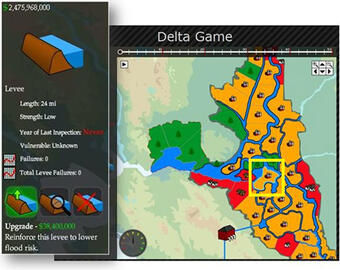Serious or pedagogical games are an engaging way to educate decisionmakers and stakeholders about environmental challenges that are usefully informed by natural and social scientific information and knowledge. USGS designed two serious games intended to promote interactive learning and exploration in the face of large uncertainties, divergent values, and complex situations. Delta Skelta is a game emulating long-term integrated environmental planning in the Sacramento-San Joaquin Delta, California, that incorporates natural hazards (flooding and earthquakes) and consequences for California water supplies amidst conflicting water interests. Age of Ecology is a game about sustainable development that simulates interactions between economic and ecologic processes, as well as natural hazards while implementing agent-based modeling.
Hazards Societal Consequences and Risk Communication Contributions

WGSC investigated the potential for serious games to be used as a scientifically based decision-support product that supports the USGS water, ecosystems, natural hazards, and land resources mission areas—to provide integrated, unbiased scientific information that can make a substantial contribution to societal well-being for a wide variety of complex environmental challenges. We developed two serious games that use challenging environmental-planning issues to demonstrate and investigate the potential to inform regional-planning decisions. Delta Skelta (figs. 1 and 2) is a game emulating long-term integrated environmental planning in the Sacramento-San Joaquin Delta, California, that incorporates natural hazards (flooding and earthquakes) and consequences for California water supplies amidst conflicting water interests. Age of Ecology (fig. 3) is a game that simulates interactions between economic and ecologic processes, as well as natural hazards while implementing agent-based modeling. Various design trade-offs pertained to factual information, strategic thinking, game-winning criteria, elements of fun, number and type of players, time horizon, and uncertainty. Serious Games can (1) establish interdisciplinary and collaborative teams with a focused integrated outcome; (2) contribute to the modeling of interaction, feedback, and adaptation of ecosystems; and (3) enable social learning through a broadly appealing and increasingly sophisticated medium.


Below are publications associated with this project.
Serious games experiment toward agent-based simulation Serious games experiment toward agent-based simulation
Serious or pedagogical games are an engaging way to educate decisionmakers and stakeholders about environmental challenges that are usefully informed by natural and social scientific information and knowledge. USGS designed two serious games intended to promote interactive learning and exploration in the face of large uncertainties, divergent values, and complex situations. Delta Skelta is a game emulating long-term integrated environmental planning in the Sacramento-San Joaquin Delta, California, that incorporates natural hazards (flooding and earthquakes) and consequences for California water supplies amidst conflicting water interests. Age of Ecology is a game about sustainable development that simulates interactions between economic and ecologic processes, as well as natural hazards while implementing agent-based modeling.
Hazards Societal Consequences and Risk Communication Contributions

WGSC investigated the potential for serious games to be used as a scientifically based decision-support product that supports the USGS water, ecosystems, natural hazards, and land resources mission areas—to provide integrated, unbiased scientific information that can make a substantial contribution to societal well-being for a wide variety of complex environmental challenges. We developed two serious games that use challenging environmental-planning issues to demonstrate and investigate the potential to inform regional-planning decisions. Delta Skelta (figs. 1 and 2) is a game emulating long-term integrated environmental planning in the Sacramento-San Joaquin Delta, California, that incorporates natural hazards (flooding and earthquakes) and consequences for California water supplies amidst conflicting water interests. Age of Ecology (fig. 3) is a game that simulates interactions between economic and ecologic processes, as well as natural hazards while implementing agent-based modeling. Various design trade-offs pertained to factual information, strategic thinking, game-winning criteria, elements of fun, number and type of players, time horizon, and uncertainty. Serious Games can (1) establish interdisciplinary and collaborative teams with a focused integrated outcome; (2) contribute to the modeling of interaction, feedback, and adaptation of ecosystems; and (3) enable social learning through a broadly appealing and increasingly sophisticated medium.


Below are publications associated with this project.

